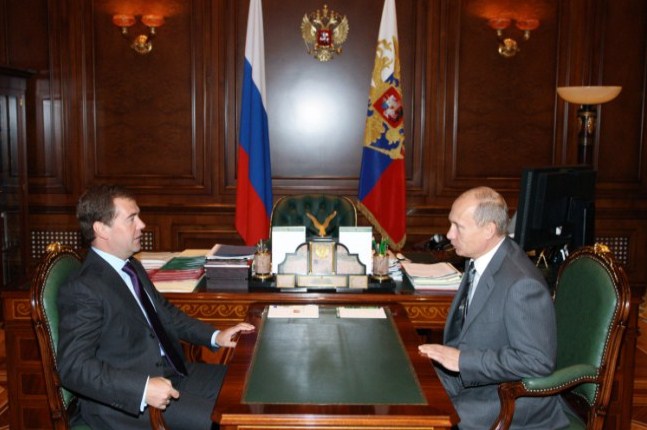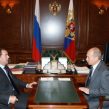
Medvedev and Putin Work on Repairing Their Dysfunctional Leadership
Publication: Eurasia Daily Monitor Volume: 6 Issue: 182
By:

President Dmitry Medvedev and Prime Minister Vladimir Putin had a rare face-to-face meeting on the evening of September 30, about which no official information was provided apart from stating that they discussed the “social-political situation in the country.” There is indeed plenty to discuss, as the economy lingers in a deep valley and both leaders point to different paths supposedly leading to sunnier slopes. Putin takes a more positive perspective and tries to talk a recovery into existence while adding a liberal twist to his confident “safe on my watch” narrative (www.gazeta.ru, Kommersant, September 30). Medvedev argues that the habitual system of recycling the oil rent has exhausted its growth potential, and only a breakthrough towards an economy of innovations might extricate Russia from its deepening recession (www.polit.ru, October 2). It is possible to bridge their differences and the meeting in Gorki was most probably perfectly friendly, but neither wants to give any serious thought as to how Russia has arrived in this situation and both attempt to lead without a reliable compass.
Putin has translated his vision for economic revival into the figures in the state budget for 2010, which his government delivered last week to the Duma. It contained no major surprises, as expenditure exceeds income by more than 40 percent, and subsequently the deficit has reached 6.8 percent of GDP, which is supposed to show a modest 1.6 percent increase (RIA-Novosti, September 30). Demonstratively reducing the expenses on the presidential administration and other apparatus, Putin has delivered on his promise to increase pensions, even if this “social emphasis” hardly compensates for the decline in domestic consumption due to falling incomes (www.newsru.com, Nezavisimaya Gazeta, October 1). The budget envisages no structural economic reforms and prescribes significant cuts in investment, so that its ideology appears to be more populist rather than anti-crisis based (Ekspert, October 1).
Reduction in investment activity, which is typical also for such state-controlled mega-companies like Gazprom, condemns the country to face protracted stagnation, and Putin repeatedly appeals to foreign investors arguing that his government acknowledges “the illusory nature of that blind faith in the state’s omnipotence” (Kommersant, www.gazeta.ru, September 30). This newly-discovered liberalism will hardly convince Western energy “majors,” who look at the Yamal gas fields with interest dampened by reflections on their recent ill-treatment in Sakhalin and Kovykta.
As for Medvedev, he made an ambitious statement on mobilizing the country for modernization against resistance from the “influential groups of corrupt officials and do-nothing ‘entrepreneurs’” in his article “Go, Russia!” which still generates public discussion (www.gazeta.ru, September 10, October 2). The common opinion is that this claim for leadership can only be taken seriously if it is accompanied by action; but Medvedev escaped from this self-laid trap by departing on his state visit to Switzerland, followed by his trip to the United States. Against the well-established pattern, he did not focus on energy matters, but it transpired that without this theme he had little else to say at the U.N. General Assembly or the G20 summit.
Meanwhile, Russian foreign policy has scored several victories, including the confirmation of full authority in the Parliamentary Assembly of the Council of Europe and the presentation of a balanced report on the Russian-Georgian war by the European Union (Rossiyskaya Gazeta, Novaya Gazeta, October 2). However, Medvedev had no part in these successes, and he did not cut an impressive figure at the military exercises in Belarus next to the khaki-clad President Alyaksandr Lukashenka, and consequently he returned to Moscow without any tangible political gains. The immediate problem for Medvedev is the reshuffling of the cadre that would demonstrate his authority to “hire-and-fire,” which is the main source of power in any bureaucratic system. Replacement of several governors does not quite fit the bill, because the real proof can only be delivered by promoting new people to the higher echelons of federal bureaucracy, while among the regional leaders, the key figure is Moscow’s Mayor Yury Luzhkov, who defends his turf with fierce determination and controls tighter than ever the forthcoming elections to the city Duma (Kommersant-Vlast, September 28).
Medvedev may be a master of Kremlin intrigue, but he is clearly stuck with the dilemma of having too few loyalists, who remain rather indifferent to the ideology of “innovation,” and mistrust the awakening reformers who would never prove sufficiently loyal. The Institute of Contemporary Development (INSOR) has tried to position itself as the key think-tank for Medvedev’s strategy, but their economic recommendations are combined with a plea to sack Vladislav Surkov, the deputy head of the presidential administration, who is in charge of PR (Ekho Moskvy, October 2). Medvedev, however, remains reluctant to relax control over the crucial media instrument –the three national television channels– and keeps Surkov close, not daring even to replace the top speechwriter (Nezavisimaya Gazeta, September 30).
Focusing on technical innovations, like replacing old-fashioned light bulbs with more energy efficient “new light,” Medvedev admits with some disappointment that these impressive designs “are not actually in use anywhere yet.” What he does not want to admit is that it takes far more than a presidential order to create real demand for innovations in the deeply depressed and bureaucratically suppressed economy. The vibrant forces of economic competition remain distorted by the inter-penetration of business and politics, and the rigid political system of Putinism is incompatible with competition, as its master confirmed by asserting that the outcome of the 2012 presidential elections will be decided in a heart-to-heart talk between himself and Medvedev (www.gazeta.ru, October 1).
It is the report on the causes of the August disaster at the Sayano-Shushenskaya hydropower station released last Saturday that has shed new light on the political issues of modernization. It assesses in great detail the risks associated with the rusting legacy of Soviet industrialization, and implicitly demonstrates the unpromising basis for an imaginary breakthrough to a high-technology economy. The real significance, however, lies in the fact that it was prepared by Igor Sechin, a key Putin henchman, and names as one of the main culprits Anatoly Chubais, who despite his errors of judgment is a bona fide reformer (www.lenta.ru, October 4). Many “modernizers” have become guilty by association, which means that Medvedev is left to drag his failing presidency to the conclusion that he was right about the inability of the system to cope with the crisis but wrong about its capacity for reforming itself.




